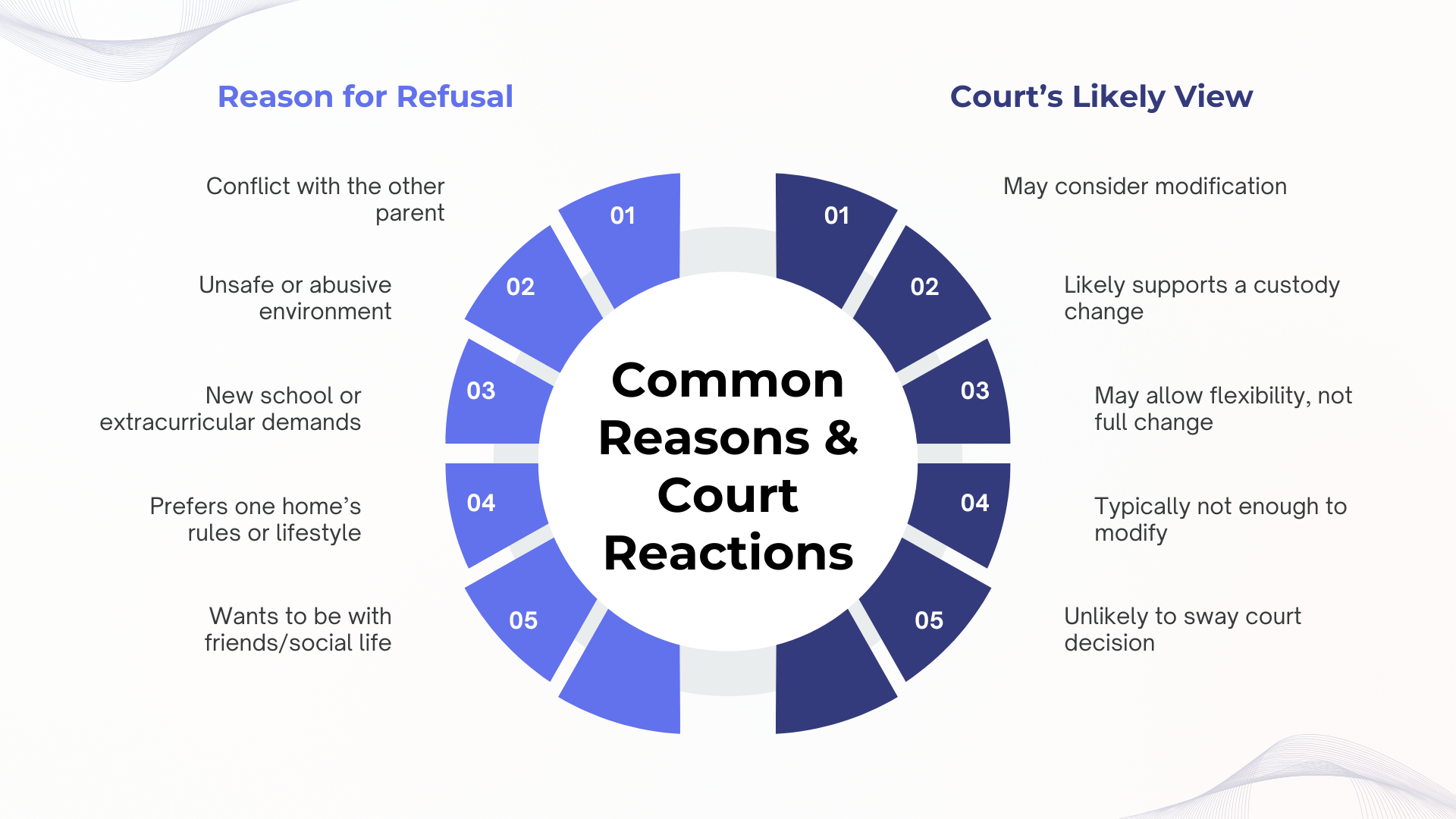
If your teenager is refusing to visit their other parent, you’re probably caught between your child’s emotions and a court order that you’re legally bound to follow. As a parent, this can be incredibly stressful—and it raises a serious legal question: can you change a Maryland custody agreement if your teen no longer wants to comply with the current terms?
The answer is: maybe. Maryland law does allow for modifications to child custody orders, but there are specific conditions and legal processes that must be followed. Here’s what you need to know if your teen’s refusal is starting to impact your court-ordered parenting schedule.
Why Your Teen’s Preferences Matter—but Aren’t Final
Teenagers are not toddlers. As they grow older, they gain more independence, stronger opinions, and in many cases, a preference for where they want to live or how they want to divide their time. Maryland courts do take a child’s preferences into account, especially as they reach adolescence.
But here’s the catch:
- A teen’s preference does not automatically override a custody order.
- You cannot simply stop following the agreement because your child doesn’t want to comply.
- Courts still prioritize the best interest of the child, not just their wishes.
If your teen’s refusal to visit the other parent becomes consistent or starts creating conflict, it may be time to explore whether you can modify your Maryland custody agreement to reflect the reality of the situation.
Legal Requirements to Modify a Maryland Custody Agreement
You can't change a custody order just because your child refuses to follow it. To modify a Maryland custody agreement, you must prove two things:
1. There Has Been a Material Change in Circumstances
A “material change” means something significant has happened since the original order was issued. This could include:
- The child experiencing emotional distress or safety concerns
- A change in either parent’s home, job, or lifestyle
- Parental noncompliance that consistently disrupts the parenting plan
2. The Change Is in the Child’s Best Interest
Even if your teen is refusing visits, the court wants to see that any modification will benefit the child emotionally, mentally, and physically—not just accommodate preferences.
Similar Post: Family Law in Maryland: Navigating Custody and Divorce with Confidence
Common Reasons Teens Refuse Visitation—and How Courts Respond
Before filing to change your Maryland custody agreement, it helps to understand why your teen is refusing visitation. Not every reason will be viewed the same in court.
Common Reasons and Court Reactions:

The court will likely want to hear from the teen directly (sometimes through a guardian ad litem or private interview) to assess the validity of their concerns.
Similar Post: Navigating Common Visitation Disputes in Maryland Divorce: What to Do When Parents Can’t Agree on Custody Arrangements
What If You Force Your Teen to Comply?
As a parent, you are expected to make reasonable efforts to follow the custody order—even when your teenager resists. That doesn’t mean physically dragging them out of the house, but it does mean:
- Encouraging them to go
- Not interfering with the other parent’s time
- Avoiding negative talk that could influence their refusal
If you don’t follow the custody agreement:
- You could be found in contempt of court
- You may face fines or legal penalties
- It could damage your own custody rights
If you’re doing your best and your child still won’t comply, it may be time to document the issue and consider filing for a modification.
How to Begin the Process of Changing Your Maryland Custody Agreement
If you're seriously considering a modification, here are the steps to follow:
1. Document the Refusals
Keep a detailed record of missed visits, your attempts to encourage compliance, and your teen’s stated reasons.
2. Communicate With the Other Parent
Try to resolve the issue outside of court. Some parents are willing to adjust informally. However, only a court-approved change is legally binding.
3. Speak With a Family Law Attorney
An experienced family law attorney can help you determine if your situation meets the legal threshold for a modification and can guide you through the process.
4. File a Motion to Modify Custody
This formal request must include evidence of a material change in circumstances and explain why the new arrangement is in your child’s best interest.
Can a Teen Testify in Court?
In Maryland, there’s no specific age when a child can automatically choose where to live. However, judges may consider a teen’s testimony if they believe:
- The teen is mature enough to express a reasoned preference
- The teen’s choice is based on valid concerns—not just convenience
The judge may allow the teen to speak privately in chambers rather than in open court. A guardian ad litem (a court-appointed advocate) may also be assigned to represent the child’s interests.
What the Court Will Consider in a Custody Modification
If your teen’s refusal becomes central to your case, the court will look at several factors:
- Is the refusal consistent and sincere?
- Is there any sign of parental alienation?
- Has the child’s academic, emotional, or social well-being been affected?
- Is the child being manipulated by either parent?
- Can a revised schedule promote more stability?
Remember:
The goal is always to protect the child’s best interest, not to punish either parent.
Tips for Parents Navigating This Situation
You're not alone—and you're not powerless. Here are some ways to handle the situation with both compassion and legal clarity:
- Keep communication open with your child
- Avoid placing blame on the other parent
- Validate your teen’s feelings without violating the custody order
- Speak with a therapist or counselor who can guide your teen through their emotions
- Seek legal advice early, before conflicts escalate
Don’t Let Conflict Upend Your Custody Rights in Maryland — Contact Maronick Law
You want what’s best for your child—and sometimes that means revisiting a custody agreement that no longer works. If your teen is refusing visitation and it’s causing conflict, confusion, or fear of violating a court order, you have options.
At Maronick Law, we understand how emotional and high-stakes custody issues can be. We’ll help you determine whether your situation qualifies for a modification and guide you through the legal process with care and clarity.
If you’re facing issues with a Maryland custody agreement, don’t wait. Contact us today at 443-551-2747 for a consultation and let us help you protect your relationship with your child while staying on the right side of the law. We represent clients in Maryland City, Cape St. Claire, Westernport, Towson and throughout Maryland.
Disclaimer: This blog is intended for informational purposes only and does not establish an attorney-client relationship. It should not be considered as legal advice. For personalized legal assistance, please consult our team directly.
